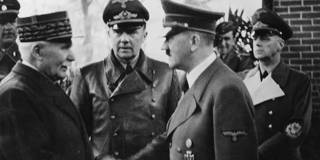OnPoint Subscriber Exclusive
Longer Reads provide in-depth analysis of the ideas and forces shaping politics, economics, international affairs, and more.

The Question of Collaboration
It has taken two generations for most countries that were occupied by Nazi Germany to admit that it was the resisters, not the collaborators, who were the minority. But now we risk swinging too far the other way: normalizing collaboration and making resistance such an exceptional choice that only saints would choose it.
VIENNA – When interviewed for his biography, Isaiah Berlin at one point wondered aloud who, in English high society, would have collaborated had the Germans invaded in 1940. The anti-Semites, chancers, and sycophants of his acquaintance made his list, but who else? Asking himself that question was a way of remaining alert to the possibilities of betrayal lurking beneath the bonhomie and mutual flattery of elite London. Berlin’s point was that when the bottom falls out of the world, you cannot be too sure what anyone will do – yourself included.